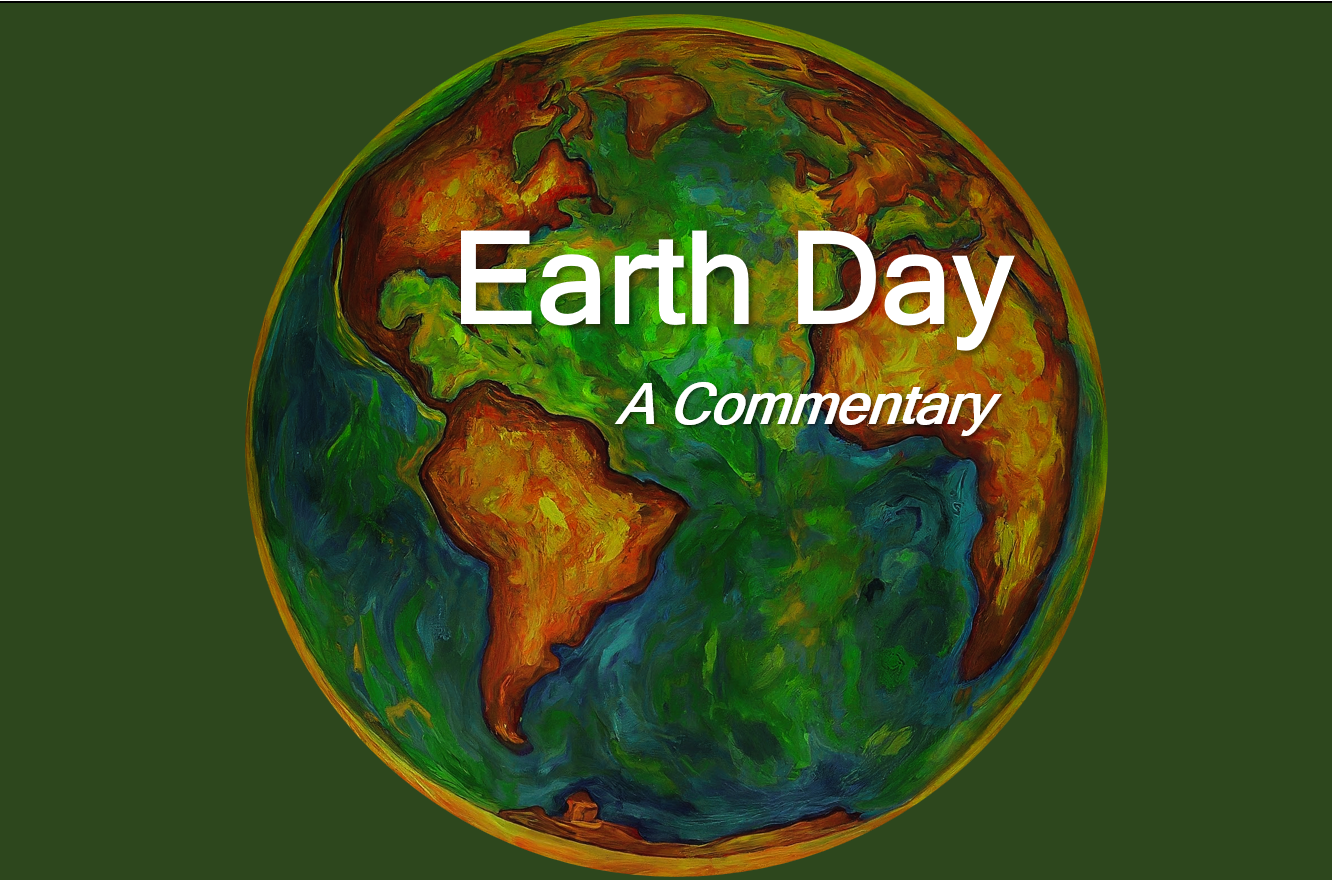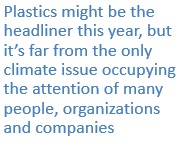 It’s heartwarming to see the flood of public enthusiasm for this year’s 54th Earth Day celebration. My inbox was filled with organizations announcing programs to recognize this year’s theme: Planet vs. Plastics. It’s a worthy observance, given the mounting evidence of plastic trash filling the oceans and plastic residue filling our bodies; even newborns today arrive on planet earth with microplastics in their placentas.[1]
It’s heartwarming to see the flood of public enthusiasm for this year’s 54th Earth Day celebration. My inbox was filled with organizations announcing programs to recognize this year’s theme: Planet vs. Plastics. It’s a worthy observance, given the mounting evidence of plastic trash filling the oceans and plastic residue filling our bodies; even newborns today arrive on planet earth with microplastics in their placentas.[1]
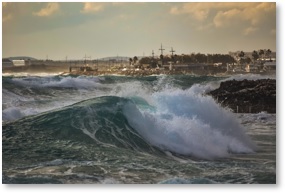 Plastics might be the headliner this year, but it’s far from the only climate issue occupying the attention of many people, organizations and companies. The oceans, which absorb 83 percent of global carbon,[2] are warming 40% faster than predicted several years ago.[3] Higher air and ocean temperatures have accelerated the melting of glaciers responsible for measurable sea-level rise.[4] Higher ocean temperatures and water acidity are killing off coral reefs at unprecedented rates.[5] Fish populations are migrating toward the poles and diving deeper to find cooler waters.[6] Changing fish populations impact the fishing industry and send boats greater distances in search of productive fisheries; still the boats come home with lower yields.[7] This has an economic impact and also increasing geopolitical and military implications, as territorial conflicts arise.[8]
Plastics might be the headliner this year, but it’s far from the only climate issue occupying the attention of many people, organizations and companies. The oceans, which absorb 83 percent of global carbon,[2] are warming 40% faster than predicted several years ago.[3] Higher air and ocean temperatures have accelerated the melting of glaciers responsible for measurable sea-level rise.[4] Higher ocean temperatures and water acidity are killing off coral reefs at unprecedented rates.[5] Fish populations are migrating toward the poles and diving deeper to find cooler waters.[6] Changing fish populations impact the fishing industry and send boats greater distances in search of productive fisheries; still the boats come home with lower yields.[7] This has an economic impact and also increasing geopolitical and military implications, as territorial conflicts arise.[8]
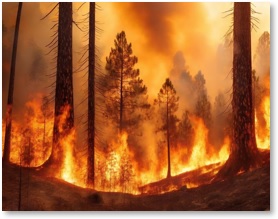 The impact of climate change on our air may be the most obvious.[9] Average air temperatures have steadily increased over the decades, but last year, alarmingly, they leaped to model-breaking levels confounding climate scientists.[10] Spiking temperatures and accompanying droughts elevate the incidence and expanse of wildfires across the planet. Higher temperatures directly increase health-related sickness including cardiovascular, respiratory and cerebrovascular diseases. Increases in ground level ozone[11] contribute to asthma, now a major health problem globally and especially among children in low-resource communities.[12] Increased storm incidence and intensity and the flooding they cause cost lives, destroy property and lead to geopolitical disruptions as people emigrate from inhospitable regions. The sweeping effects of climate change are now as evident to the casual observer as they have been for years to global scientists bearing hard empirical data.[13]
The impact of climate change on our air may be the most obvious.[9] Average air temperatures have steadily increased over the decades, but last year, alarmingly, they leaped to model-breaking levels confounding climate scientists.[10] Spiking temperatures and accompanying droughts elevate the incidence and expanse of wildfires across the planet. Higher temperatures directly increase health-related sickness including cardiovascular, respiratory and cerebrovascular diseases. Increases in ground level ozone[11] contribute to asthma, now a major health problem globally and especially among children in low-resource communities.[12] Increased storm incidence and intensity and the flooding they cause cost lives, destroy property and lead to geopolitical disruptions as people emigrate from inhospitable regions. The sweeping effects of climate change are now as evident to the casual observer as they have been for years to global scientists bearing hard empirical data.[13]

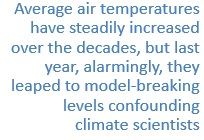 Present trends cannot continue without severely impacting all life on earth. So, it is gratifying to see the public celebrating Earth Day. But that is not enough. Buying T-shirts with Earth Day slogans isn’t enough. Recycling cardboard isn’t enough. Picking up trash on the beach is not enough. Attending Earth Day concerts and art festivals and writing essays like this one are not enough. They are barely a start.
Present trends cannot continue without severely impacting all life on earth. So, it is gratifying to see the public celebrating Earth Day. But that is not enough. Buying T-shirts with Earth Day slogans isn’t enough. Recycling cardboard isn’t enough. Picking up trash on the beach is not enough. Attending Earth Day concerts and art festivals and writing essays like this one are not enough. They are barely a start.
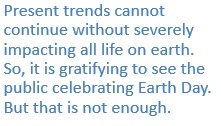 Climate change must be addressed by large collectives and that means governments. Only large, concerted efforts have a chance of slowing destruction of our planet. Yes, private industry must press its shoulder to the cart. In the best of all worlds, corporations would lead the world to carbon reduction and cleanup, with efficient manufacturing, smarter products and better use of natural resources. But governments need to establish a framework for industries, organizations and populations more generally to adopt policies and behaviors that contribute to collective solutions.
Climate change must be addressed by large collectives and that means governments. Only large, concerted efforts have a chance of slowing destruction of our planet. Yes, private industry must press its shoulder to the cart. In the best of all worlds, corporations would lead the world to carbon reduction and cleanup, with efficient manufacturing, smarter products and better use of natural resources. But governments need to establish a framework for industries, organizations and populations more generally to adopt policies and behaviors that contribute to collective solutions.
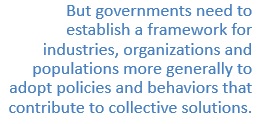 Such a framework might include the promotion of wind and solar farms, the adoption of energy saving appliances and vehicles, and amping up recycling programs that actually recycle. It might include policies that build lifecycle costs into purchase prices and then apply those funds to remediation. Some will complain that such measures are costly and cannot be imposed on consumers. Really? Does anyone believe that the impacts of climate change even now aren’t already costing us? Those costs will spike out of sight in the years ahead.
Such a framework might include the promotion of wind and solar farms, the adoption of energy saving appliances and vehicles, and amping up recycling programs that actually recycle. It might include policies that build lifecycle costs into purchase prices and then apply those funds to remediation. Some will complain that such measures are costly and cannot be imposed on consumers. Really? Does anyone believe that the impacts of climate change even now aren’t already costing us? Those costs will spike out of sight in the years ahead.
 WiRED International recognizes that human and animal health are inextricably linked to the health of our planet. Climate change is a major factor impacting both, and it’s impossible to consider one without the other. Disease, hunger, migration, and even loss of life are all directly affected by the quality of the air and water that sustains all life.
WiRED International recognizes that human and animal health are inextricably linked to the health of our planet. Climate change is a major factor impacting both, and it’s impossible to consider one without the other. Disease, hunger, migration, and even loss of life are all directly affected by the quality of the air and water that sustains all life.
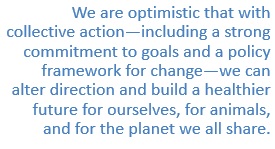 This Earth Day, we acknowledge the challenges posed by climate change with open eyes. But we also hold onto the knowledge that we can still reverse course. We are optimistic that with collective action—including a strong commitment to goals and a policy framework for change—we can alter direction and build a healthier future for ourselves, for animals, and for the planet we all share.
This Earth Day, we acknowledge the challenges posed by climate change with open eyes. But we also hold onto the knowledge that we can still reverse course. We are optimistic that with collective action—including a strong commitment to goals and a policy framework for change—we can alter direction and build a healthier future for ourselves, for animals, and for the planet we all share.
[1] https://www.ncbi.nlm.nih.gov/pmc/articles/PMC9517680/
[2] https://www.msc.org/what-we-are-doing/oceans-at-risk/climate-change-and-fishing
[3] https://www.scientificamerican.com/article/oceans-are-warming-faster-than-predicted/
[4] https://www.wilsoncenter.org/blog-post/melting-arctic-sea-ice-does-not-itself-raise-sea-levels
https://aambpublicoceanservice.blob.core.windows.net/oceanserviceprod/hazards/sealevelrise/noaa-nos-techrpt01-global-regional-SLR-scenarios-US.pdf
[5] https://www.c2es.org/document/coral-reefs-global-climate-change-potential-contributions-of-climate-change-to-stresses-on-coral-reef-ecosystems/
[6] https://phys.org/news/2023-05-marine-fish-ocean-relocating-poles.html#google_vignette
[7] https://www.fisheries.noaa.gov/insight/understanding-our-changing-climate
[8] https://static.rusi.org/future-iuu-fishing-in-a-warming-world-a-global-horizon-scan.pdf
[9] https://www.epa.gov/climateimpacts/climate-change-impacts-air-quality
[10] https://www.washingtonpost.com/climate-environment/2024/04/19/record-temperatures-heat-climate/
[11] https://www.sciencedaily.com/releases/2019/07/190723121906.htm
[12] https://www.ncbi.nlm.nih.gov/pmc/articles/PMC9606573/
[13] https://www.ecb.europa.eu/pub/pdf/scpwps/ecb.wp2608~2058b5dc8f.en.pdf

